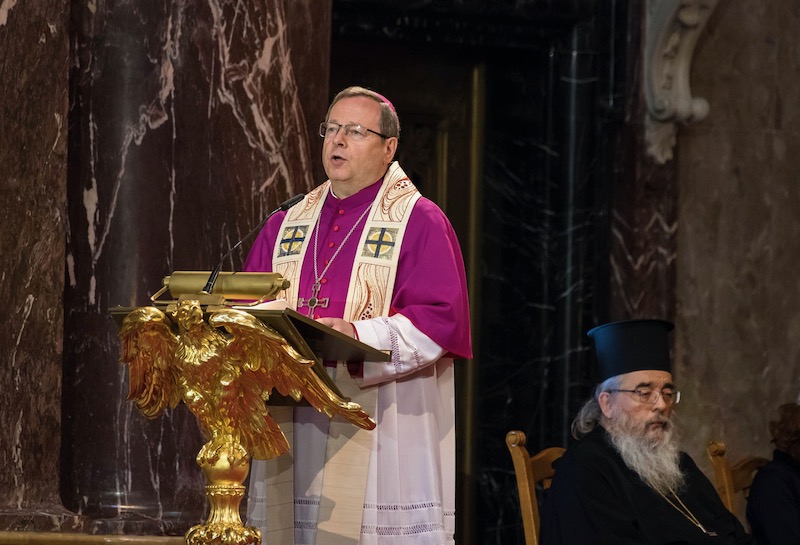11 May 2020, The Tablet
Role of German bishops in Second World War ‘shameful’

Commemorations
of the 75th anniversary of the end of the Second World War began in
Berlin Cathedral with an ecumenical service with Georg Bätzing, chairman
of the Catholic German Bishops' Conference and Bishop of Limburg,
Christian Ditsch/DPA/PA Images
Christian Ditsch/DPA/PA Images
In
preparation for the 75th anniversary of the end of the Second World War,
the German bishops conducted an in-depth study of the behaviour of
their predecessors under the Nazi regime. On 29 April, the German
bishops’ conference presented the conclusions they had come to in a
declaration entitled “German bishops during World War II”.
They had been encouraged to undertake the
study by repeated complaints that the Catholic bishops in Hitler’s
Germany had left German Catholic soldiers alone to cope with the moral
dilemma they were in at the time.
The bishops came to the conclusion that
despite individual opposition to Hitler on the part of one or two
bishops, the Catholic Church remained part of society during the war.
Its patriotic willingness to mobilise the Church’s material, personal
and mental resources for the war effort remained unbroken until the very
end, they say.
The German bishops never protested openly
against the Nazi war effort – not in September 1939 when war against
Germany was declared – nor at any time afterwards, the bishops point
out. “And hardly a voice was raised against the monstrous crimes
committed against people who were persecuted because they belonged to an
‘alien race’, especially the Jews.” Individual bishops did protest, for
instance against euthanasia, but Catholic soldiers who were confronted
with the regime’s rampant violence at the various fronts and sought
spiritual help could not turn to their bishops.
The present bishops come to the conclusion
that as their predecessors did not clearly oppose the Nazi regime, they
bore part of the blame, and they find this “particularly shameful”.
At the presentation on 29 April, bishops’
conference president Bishop Georg Bätzing explained that while many
aspects of the German Church’s behaviour during the war had been
reappraised, there were two notable gaps, a “memory gap” and a
“confession gap”. The present German bishops had wanted to fill these
two gaps. He and his colleagues had not found this easy as no generation
was free of era-specific prejudices. “However, future generations must
always face history in order to learn from it”, Bätzing underlined.






No comments:
Post a Comment